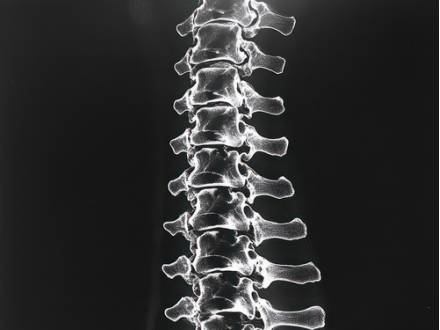Recent Blog Posts
Spinal Cord Injuries and Paralysis After a Truck Accident
 Recent data from the National Safety Council shows that large trucks are involved in thousands of fatal crashes per year. The sheer size disparity between trucks and most other vehicles means that, even in non-fatal cases, a high-speed collision will often leave the other driver in fragile condition. If you or somebody you love has suffered a spinal cord injury caused by a truck accident, contact a Rockford, IL truck accident attorney to discuss your options for recovering compensation.
Recent data from the National Safety Council shows that large trucks are involved in thousands of fatal crashes per year. The sheer size disparity between trucks and most other vehicles means that, even in non-fatal cases, a high-speed collision will often leave the other driver in fragile condition. If you or somebody you love has suffered a spinal cord injury caused by a truck accident, contact a Rockford, IL truck accident attorney to discuss your options for recovering compensation.
At Mannarino & Brasfield, A Division of Schwartz Jambois, we know how devastating a spinal cord injury can be, especially when it leads to paralysis. Our firm will fight for full compensation for a catastrophic injury, as we have successfully represented many clients in cases involving spinal cord injuries and brain damage.
How Can I Tell if My Baby Was Brain Damaged During Delivery?
 There’s no denying that childbirth is a stressful experience. When doctors and nurses fail in their duties, the health of the mother or the baby could be placed at risk. In more serious cases, the child could be left with lasting injuries, including brain damage. If you suspect that your baby suffered brain damage during delivery, reach out to a Rockford, IL medical malpractice attorney.
There’s no denying that childbirth is a stressful experience. When doctors and nurses fail in their duties, the health of the mother or the baby could be placed at risk. In more serious cases, the child could be left with lasting injuries, including brain damage. If you suspect that your baby suffered brain damage during delivery, reach out to a Rockford, IL medical malpractice attorney.
At Mannarino & Brasfield, A Division of Schwartz Jambois, we take birth injuries incredibly seriously. When you work with our firm, we will take aggressive measures to hold the right people accountable for your child’s injuries, seeking full payment for your damages. You will only pay for our services if we win, so don’t hesitate to get in contact with us.
Early Signs of Brain Damage in Infants
Possible signs of infant brain damage can show up very soon after birth. Some babies seem very sleepy all the time and are hard to wake. Nurses or parents may notice that the baby has trouble breathing regularly, turns blue around the lips, or has trouble feeding without choking or gagging.
What Types of Compensation Can Victims of Amputation Injuries Receive?
 Amputations change lives forever for the victims who suffer the amputation. But for families and friends who support these victims, things change dramatically as well. These catastrophic injuries can occur in many ways, including:
Amputations change lives forever for the victims who suffer the amputation. But for families and friends who support these victims, things change dramatically as well. These catastrophic injuries can occur in many ways, including:
-
Workplace accidents, especially on construction sites
-
Severe chemical exposure
Sometimes the injury itself causes a traumatic amputation, meaning the limb is severed during the accident. Other times, the damage to a limb is so severe that doctors must amputate it surgically.
Whatever the cause, losing a limb causes serious challenges for the victim and their family. Sometimes, victims of amputation injuries are entitled to compensation. This can never bring a limb back, but it can help with the costs and changes resulting from this major surgery.
What Is Hypoxic Ischemic Encephalopathy?
 Hypoxic ischemic encephalopathy is a type of birth injury caused by oxygen deprivation and reduced blood flow to an infant's brain during pregnancy, labor, or delivery. This lack of oxygen damages brain cells and can result in permanent disabilities, including cerebral palsy, developmental delays, seizures, and cognitive impairments. When medical negligence causes HIE, families can pursue compensation to cover the lifetime costs of caring for an injured child.
Hypoxic ischemic encephalopathy is a type of birth injury caused by oxygen deprivation and reduced blood flow to an infant's brain during pregnancy, labor, or delivery. This lack of oxygen damages brain cells and can result in permanent disabilities, including cerebral palsy, developmental delays, seizures, and cognitive impairments. When medical negligence causes HIE, families can pursue compensation to cover the lifetime costs of caring for an injured child.
If your baby is diagnosed with HIE in 2026, you owe it to yourself and your family to meet with a Rockford personal injury attorney. You may be able to get significant help from the doctor or hospital responsible.
Traumatic Brain Injuries After a Car Accident Can Change Your Life
 While a traumatic brain injury (TBI) can happen in seconds, the effects can last a lifetime. Following an Illinois car accident, head trauma victims may walk away believing they are "fine," only to begin experiencing headaches, memory problems, mood changes, or cognitive difficulties hours, days, or weeks later. TBIs are some of the most misunderstood – and most devastating – injuries caused by car collisions.
While a traumatic brain injury (TBI) can happen in seconds, the effects can last a lifetime. Following an Illinois car accident, head trauma victims may walk away believing they are "fine," only to begin experiencing headaches, memory problems, mood changes, or cognitive difficulties hours, days, or weeks later. TBIs are some of the most misunderstood – and most devastating – injuries caused by car collisions.
Because symptoms can be delayed or not visible, insurance companies may question the injuries or even argue that the crash was not the cause. TBIs impact the victim as well as his or her loved ones, and the consequences can last months, years, or forever. Many TBI victims struggle to return to work, maintain relationships, or simply handle day-to-day activities.
Since TBI injuries are often invisible, they can be misunderstood and not taken seriously, not only by the insurance company but also by employers, friends, and family members. Understanding the severity of a TBI is the first step in protecting your health and your right to compensation. Having a highly experienced Winnebago County, IL personal injury lawyer on your side can make a significant difference in the outcome of your case.
Can I Sue for Medical Malpractice If I Was the Victim of a Surgical Mistake During a C-Section?
 A Cesarean section, or C-section, is one of the most common surgical procedures performed in the United States. Most of the time, C-sections are a safe way to deliver a baby when vaginal delivery would be dangerous for the mother or child. C-Sections are also used as needed when emergencies come up during childbirth.
A Cesarean section, or C-section, is one of the most common surgical procedures performed in the United States. Most of the time, C-sections are a safe way to deliver a baby when vaginal delivery would be dangerous for the mother or child. C-Sections are also used as needed when emergencies come up during childbirth.
In Illinois, thousands of C-sections are performed every year, and the vast majority go smoothly. However, when medical professionals make preventable mistakes before, during, or after surgery, those mistakes can cause catastrophic injuries.
At Mannarino & Brasfield, A Division of Schwartz Jambois, our Rockford and Winnebago County birth injury lawyers represent mothers who have suffered severe injuries from mistakes during C-sections. We take our clients’ cases seriously and chase after serious compensation. If we do not win – you do not pay.
Will a Baby Recover from Brain Damage at Birth?
 When a baby suffers brain damage during birth, families are often afraid and have overwhelming questions that demand answers. Will our baby recover? How will we afford the treatments, therapies, and lifelong care our baby may need?
When a baby suffers brain damage during birth, families are often afraid and have overwhelming questions that demand answers. Will our baby recover? How will we afford the treatments, therapies, and lifelong care our baby may need?
These questions do not have simple answers, but when it comes to infant brain damage, one thing is clear: Early diagnosis, immediate medical intervention, and experienced legal support can all make a difference.
For many families, a Rockford, IL birth injury attorney can help uncover what went wrong. This means finding out whether medical negligence played a role in what happened to your baby. It can also mean pursuing compensation to pay for your child’s medical care and future needs.
What Causes Brain Damage at Birth?
Brain damage during labor and delivery often results from a lack of oxygen or blood flow to a baby’s brain. This is a condition called hypoxic-ischemic encephalopathy (HIE). HIE can occur for many reasons, including:
What to Expect When a Wrongful Death Case Goes to Trial
 Losing someone you love because of someone else’s mistake or carelessness is one of life’s worst-case scenarios. Unfortunately, it happens way too often and families are left reeling and wondering what to do next.
Losing someone you love because of someone else’s mistake or carelessness is one of life’s worst-case scenarios. Unfortunately, it happens way too often and families are left reeling and wondering what to do next.
Many people turn to the legal system to try to hold whoever was responsible for the death accountable. But wrongful death cases can be complicated, and going to trial is a major undertaking. Knowing what to expect can help families feel more prepared.
At Mannarino & Brasfield, A Division of Schwartz Jambois, our Rockford, IL wrongful death attorneys handle cases for victims of all ages, including very serious cases involving infants and children. We have won millions in verdicts and provide free consultations to explain your options and guide you through what going to trial might look like.
When Does a Wrongful Death Case Go to Trial?
A wrongful death case starts when a family files a lawsuit against the person or company they believe killed their relative. Cases can involve car accidents, medical mistakes, workplace accidents, or unsafe conditions.
Proving Distracted Driving in High-Speed Rear-End Collisions
 Rear-end collisions are very common, but their commonality does not reduce their seriousness. When they happen on freeways at high speeds, rear-end crashes can be devastating. Victims in both vehicles can suffer severe injuries with long-term consequences.
Rear-end collisions are very common, but their commonality does not reduce their seriousness. When they happen on freeways at high speeds, rear-end crashes can be devastating. Victims in both vehicles can suffer severe injuries with long-term consequences.
When these car accidents happen because a driver is distracted — for example, if a driver is texting or looking down at a phone’s GPS at the time of the collision — victims may be able to sue for compensation. These cases demand careful investigation and strong proof.
At Mannarino & Brasfield, A Division of Schwartz Jambois, our Rockford, IL car accident attorney has secured millions of dollars in verdicts and settlements for clients injured in serious crashes. With free consultations and contingency billing, clients owe us nothing unless we win their cases. For families facing life-changing injuries or wrongful death, we have the resources and strategies to hold distracted drivers accountable.
Is the Driver Always at Fault When a Car Turns Left in Front of a Motorcycle?
 Left-turn accidents are some of the most dangerous crashes for motorcyclists. When a driver turns left in front of an oncoming motorcycle, the rider has little time to react. These collisions usually happen at higher speeds and can cause life-changing injuries or even death. Because these accidents are so common, many people assume the driver of the car is always at fault.
Left-turn accidents are some of the most dangerous crashes for motorcyclists. When a driver turns left in front of an oncoming motorcycle, the rider has little time to react. These collisions usually happen at higher speeds and can cause life-changing injuries or even death. Because these accidents are so common, many people assume the driver of the car is always at fault.
While car drivers are indeed often to blame for motorcycle accidents, the truth is more complicated. Who is responsible depends on what happened during the crash, how both the driver and the rider were behaving, and what Illinois traffic laws say.
Our Rockford, Illinois personal injury attorneys have decades of experience handling these types of cases. We have recovered millions of dollars for injured clients, and we know what it takes to prove fault in left-turn accidents. Call us today at 815-215-7561 to talk about your situation.



